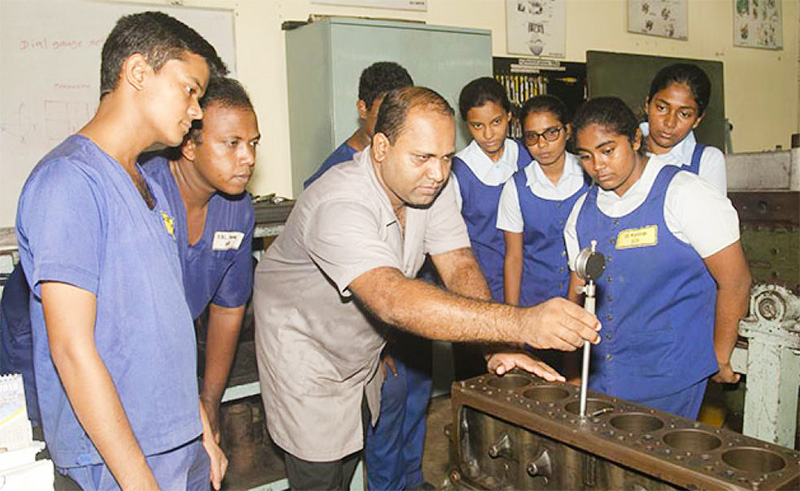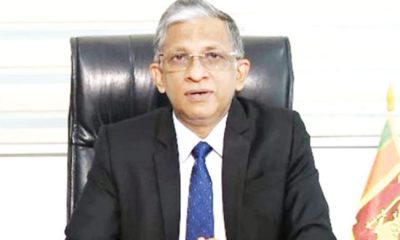News
‘Universities need to play a bigger role in TVET sector’

By Rathindra Kuruwita
Technical and Vocational Education and Training (TVET) neededs to change as the world had transformed with the advent of new technologies, Dr. Harsha Aturupane, World Bank’s lead economist and programme leader for human development for Sri Lanka and the Maldives, said in a televised interview recently.
Dr. Athurupane said complex and advanced machines were now widely used, and Sri Lankan job seekers must learn to work with them.
“When I was at university, there were blackboards and chalk. We didn’t have computers. Now, we think of smart classrooms. Computers are widely used. How we teach and learn has changed from blackboards to computers. Old lecturers didn’t need to use computers, but now it’s a vital skill. This is the same with other human capital development.”
Dr. Aturupane said that universities need to play a bigger role in the dissemination of new technologies. He said that the world is now in the fourth industrial revolution.
“The new digital world poses many challenges. We need to change our jobs, the way we teach, what we teach and how we conduct research. I believe that universities must take the leadership in this. The fourth industrial revolution is led by universities and its researchers. These academics and researchers must show how we should face the challenges of the fourth industrial revolution. Then comes teachers at schools and the instructors at TVET centres.”
He added that TVET is important for youth between 16 and 20 who are seeking the skills demanded by the job market. He added that most Sri Lankans think that TVET is about producing mechanics and heavy machine operators.
“There are many other things that are applicable to all jobs. Creativity and analytical skills are vital for all jobs. The ability to mingle well with your teammates is vital, too. It is an asset if a person can be productive and accomplish tasks.”
Dr. Aturupane said that the Sri Lankan population is aging, and this poses a significant challenge to the economy.
“The youth find it difficult to bear the burden of the old. There are several ways of addressing this. One of these is to enhance the productivity of young people. We need to boost their human capital. We must improve their skills, attitude and knowledge. Furthermore, we can also use more machinery instead of relying solely on labour.”
Sri Lankan women have a high degree of education, he said. Most students at universities are women. However, only about 32 percent of the women are working.
“When we look at the working-age population, only one in three women is in the job market. But women are more educated than men. We are losing out on human capital. Some women stop working after they have babies. Some women are looking after the elderly parents. These are not bad things. However, there should be mechanisms to do these things. For example, a lot of young people are going abroad. Who will look after their parents? This must be addressed by companies that look after the elderly. Companies must also provide babycare. When these companies develop, young women can join the workforce more.”
The Sri Lankan economy is increasingly being driven be services and these sectors are digitizing at a rapid phase, he said, adding that Sri Lanka managed to shift to online education during the COVID-19 pandemic, but digitization of the TVET sector is slow.
“This does not mean people are not trying. The sector needs more funding and assistance.”
About 30 percent of TVET training is given by the private sector. The government must provide education and TVET for low income people, he said.
“The government must ensure that the private sector maintains minimum standards. There are some private institutions that provide substandard training.”
Entrepreneurship is also a valuable skill, he said. Some people naturally have this skill, and the government must take steps to enhance their skills and create an atmosphere where they can use their skills to expand the economy, Dr. Aturupane said.
News
US sports envoys to Lanka to champion youth development

The U.S. Embassy in Colombo welcomed the U.S. Sports Envoys to Sri Lanka, former National Basketball Association (NBA) and Women’s National Basketball Association (WNBA) players Stephen Howard and Astou Ndiaye, from June 8 through 14.
The Public Diplomacy section of the U.S. Embassy said that it would launch a weeklong basketball program intended to harness the unifying power of sports, made possible through collaboration with Foundation of Goodness and IImpact Hoop Lab.
While in Sri Lanka, Howard and Ndiaye, both retired professional basketball players, will conduct a weeklong program, Hoops for Hope: Bridging Borders through Basketball. The Sports Envoys will lead basketball clinics and exhibition matches and engage in leadership sessions in Colombo and Southern Province for youth aged 14-18 from Northern, Uva, Eastern and Western Provinces, offering skills and leadership training both on and off the court. The U.S. Envoys will also share their expertise with the Sri Lanka Basketball Federation, national coaches, and players, furthering the development of basketball in the country. Beyond the clinics, they will collaborate with Sri Lankan schoolchildren to take part in a community service project in the Colombo area.
“We are so proud to welcome Stephen and Astou as our Sports Envoys to Sri Lanka, to build on the strong people-to-people connections between the United States and Sri Lanka,” said U.S. Ambassador Julie Chung. “The lessons that will be shared by our Sports Envoys – communication, teamwork, resilience, inclusion, and conflict resolution – are essential for leadership development, community building, equality, and peace. The U.S. Sports Envoy program is a testament to our belief that sports can be a powerful tool in promoting peace and unity.”
News
Rahuman questions sudden cancellation of leave of CEB employees

SJB Colombo District MP Mujibur Rahuman in parliament demanded to know from the government the reasons for CEB suspending the leave of all its employees until further notice from Thursday.
MP Rahuman said that the CEB has got an acting General Manager anew and the latter yesterday morning issued a circular suspending leave of all CEB employees with immediate effect until further notice.
“We demand that Minister Kanchana Wijesekera should explain this to the House. This circular was issued while this debate on the new Electricity Amendment Bill was pending. There are many who oppose this Bill. The Minister must tell parliament the reason for the urge to cancel the leave of CEB employees,” the MP said.However, Speaker Mahinda Yapa Abeywardena prevented Minister Wijesekera responding to the query and said that the matter raised by MP Rahuman was not relevant.
News
CIPM successfully concludes 8th Annual Symposium

The Chartered Institute of Personnel Management (CIPM) successfully concluded the 8th Annual CIPM Symposium, which took place on 31st May 2024. Themed “Nurturing the Human Element—Redefining HRM in a Rapidly Changing World,” the symposium underscored the pivotal role of human resource management (HRM) in today’s dynamic global landscape. Since its inception in 1959, CIPM has been dedicated to advancing the HR profession through education, professional development, and advocacy, solidifying its position as Sri Lanka’s leading professional body for HRM.
Ken Vijayakumar, the President of the CIPM, graced the occasion as the chief guest. The symposium commenced with the welcome address by the Chairperson, Prof. Arosha Adikaram, followed by the Web Launch of the Symposium Proceedings and Abstract Book by the CIPM President. The event featured distinguished addresses, including a speech by Chief Guest Ken Vijayakumar, President of CIPM, and an address by Guest of Honor Shakthi Ranatunga, Chief Operating Officer of MAS Holdings Pvt. Ltd., Sri Lanka.
The symposium also featured an inspiring keynote address by Prof. Mario Fernando, Professor of Management and Director of the Centre for Cross Cultural Management (CCCM) at the University of Wollongong, Australia.
Vote of Thanks of the inauguration session was delivered by Dr. Dillanjani Weeratunga, Symposium Co-chair.
The symposium served as a comprehensive platform for researchers to present their findings across a wide range of critical topics in HRM. These included Cultural Diversity and Inclusion, Talent Development and Retention, Ethical Leadership and Corporate Social Responsibility, Adapting to Technological Advancements, Mental Health and Well-being at Work, Global Workforce Challenges, Employee Empowerment, and Reskilling and Upskilling.
The plenary session was led by Prof. Wasantha Rajapakse. Certificates were awarded to the best paper presenters during the valedictory session, followed by a vote of thanks delivered by Kamani Perera, Manager of Research and Development.
The annual symposium of CIPM was a truly inclusive event, attracting a diverse audience that spanned undergraduates, graduates, working professionals, research scholars and lecturers. This widespread interest highlights the symposium’s significance in the field of HRM, offering a unique opportunity for everyone to network and learn from scholarly brains.The CIPM International Research Symposium was sponsored by Hambantota International Port, Sri Lanka Institute of Information Technology (SLIIT), E B Creasy & Co. PLC, and Print Xcel Company.














